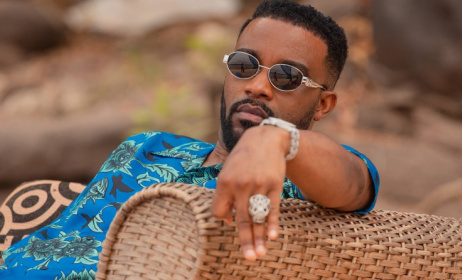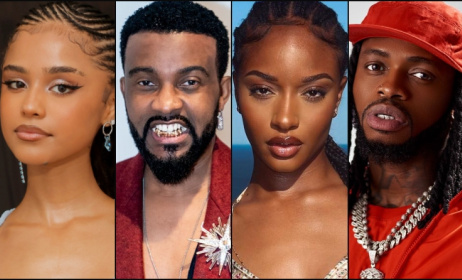Trace’s Sam Onyemelukwe unpacks upcoming awards show in Rwanda
Twenty years ago, the African pop music scene was highly fragmented, with the success of the big stars of the day largely confined to their countries or regions of origin.
 Trace senior VP of global business development Sam Onyemelukwe.
Trace senior VP of global business development Sam Onyemelukwe.
For Trace, a new Afro- and urban-facing music media company that was being launched at the time, there was little in the way of locally generated, surefire offerings that could be beamed to a young and restless pan-African audience slowly acquainting itself with the joys of the World Wide Web – so American hip hop and R&B sufficed.
Then, over the years, something started happening: an evolution (if not a birth) that Trace can claim a role in. It started with a wave of Nigerian numbers we now refer to collectively as Afrobeats. Soon after, the continent was moving to the beats of bongo flava, amapiano, zouk, kizomba, mbalax, and others, which Trace TV broadcast to millions of living rooms via satellite.
It’s this special relationship forged during the infancy of the modern African music revolution that will form part of Trace’s 20th anniversary celebrations this year. To honour the music and the musicians who have not only defined the era but elevated Africa’s sound globally, Trace will hold the first Trace Awards & Festival in Kigali, Rwanda, from 19 to 21 October 2023.
With just days to go, Sam Onyemelukwe, Trace’s senior vice-president of global business development and co-executive producer of the awards and festival, unpacks what we can expect from the celebrations.
MUSIC IN AFRICA: Why were the Trace Awards created?
SAM ONYEMELUKWE: For a long time now, we’ve contemplated holding an awards programme but we wanted something different, something that fits with the Trace ethos and goals. The fact of the matter is that in the last few years, the awards landscape has shifted quite a bit and there really aren’t many big pan-African music awards any more. Luckily, the plan to mark our 20th anniversary turned into a happy coincidence. We’ve been discussing with not only the Rwandan government but several other African governments about the possibility of hosting an awards ceremony. The Rwandan government, as you may be aware, is currently very serious about events and stimulating the creative industry, and things just fell into place. We finalised our discussions late last year and signed the contract right at the beginning of the year. So it was really time for a truly African celebration of the music and the African creative. We also look at Africa as not only the five regions but the diaspora as well. So you will see that we have regional awards for artists in the UK, North America, Latin America and the Caribbean to celebrate and integrate talent across the entire Trace network.
What’s the awards’ social mission?
This can be looked at in two ways. One of the key factors for us has been that, across the board, Trace is a mission-driven company. This can be seen through programmes like Trace Academia and many other initiatives we are involved in that are not only aligned with many of the SDGs [Sustainable Development Goals] but also with the African Union missions. The second part of it is the impact element. We actually have awards specifically targeting artists that are using their fame and money to impact their communities.
Tell us what went into the nomination process.
Oh my God, there was a lot of stress not only in the selection of the nominees but even the categories. For the nominees, we tried to use as much data as possible. But still not everyone is happy with what we have put out, and rightly so. Of course we would have loved to celebrate every aspect of the music industry, every aspect of the creative industry, but it’s just not possible, right?
Who are some of the confirmed artists and what sort of performances can we expect?
I will mention Davido, Tiwa Savage, Rema, Mr Eazi and Uncle Waffles for now. The performances at the awards are going to be really special, as we’re taking this great range of artists and joining them to do collaborations, new remixes. So we’re going to have unique and exclusive music at the festival. We will bring most of the artists in several days before the awards to rehearse with The Compozers from Ghana, which will be the house band for the show. We’re also very excited about the upcoming artists and there are a lot of events around the festival that will give them the opportunity to showcase. We’re also going to conduct a few workshops led by some top artists and music executives who will share industry insights on how to boost your career.
What is holding back African music?
One is education, which is not something that’s really specific to Africa. In a lot of places around the world, up-and-coming artists only know they want to make music. But the understanding that it’s a business and that you have to develop your knowledge along with your craft music is important. And then there’s the understanding of intellectual property rights. The fact that royalties are barely paid anywhere on the continent is a huge loss for the industry. This represents millions in dollars lost annually. We need collaborations with governments and the private sector to close these gaps because this is not only going to boost the music industry but the economies in general. But I’m overly optimistic that we’re headed in the right direction. We’ve got a long way to go, but the best motivation ever is there. When you see the kind of revenues Burna Boy, Wizkid and Diamond Platnumz are making and the ecosystems growing around them, you just can’t ignore that, can you?



























Commentaires
s'identifier or register to post comments